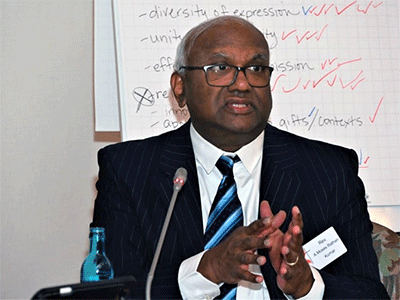An international group of United Methodist leaders has long worked on plans to add five more bishops to the African continent, increasing the total from 13 to 18.
However, those plans are now facing strong headwinds as The United Methodist Church grapples with reduced finances and rising church disaffiliations in the U.S. and the departures of annual conferences in Eurasia. At the same time, church leaders agree the need continues to be great for more episcopal leadership on a continent where the church is growing.
During its meeting in Braunfels, the denomination’s Standing Committee on Central Conference Matters discussed the challenges facing its Africa Comprehensive Plan that includes the five new episcopal areas. The group is a permanent committee of General Conference, the denomination’s top lawmaking assembly, that works with central conferences — church regions in Africa, Asia, and Europe.
The Episcopal Fundcovers the costs not only of bishops’ compensation, travel and meetings but also that of the denomination’s ecumenical staff and at least some portion of bishops’ office staff.
Your support of the Episcopal Fund apportionment helps pay the salaries and benefits of United Methodist Bishops and allows them to travel across their episcopal areas providing mentorship and leadership.
Its revenue comes mainly from the denomination’s annual conferences, church regional bodies that each pay apportionments — or shares of giving — to support denomination-wide ministries. The conferences in turn ask for apportionments from their local churches. Annual conferences worldwide support the Episcopal Fund.
The General Council on Finance and Administration — the denomination’s finance agency — is projecting that U.S. church disaffiliations and closures will result in a significant drop in expected giving.

Kumar said there will need to be a reduction of bishops worldwide to keep the Episcopal Fund solvent
“What happens in the Northeastern Jurisdiction impacts the whole church,” said Bickerton, referencing the U.S. jurisdiction where he is a member and leads the New York Conference.
“What happens in Africa impacts the whole connection. We are interdependent, and our decisions impact those outside of our region,” he added. “We are used to doing things independently, and our current realities require us to work together.”
Bishop Gregory Palmer, who chairs the standing committee’s Africa Comprehensive Plan team, said the team still believes organizing additional episcopal areas is a key part of The United Methodist Church’s efforts to draw people to Christ.
Even with the dramatic changes in the denomination, the team affirmed the continued missional need for additional bishops in Africa. Palmer said the church needs to find ways to live into the current reality while guided by aspirations.
Palmer said the team is looking at all circumstances to bring a recommendation to the standing committee that does not pit one part of the church against another part of the church.
Bickerton told the standing committee that efforts are already underway to shore up the denomination’s Episcopal Fund.
Bishop Harald Rückert, standing committee co-chair and episcopal leader of the Germany Central Conference, said central conferences are showing a great willingness to take responsibility for projects and finances.
In the end, the standing committee raised questions that will go into consideration of any final proposal to General Conference.
excerpt from a story by Klaus Ulrich Ruof, public relations officer and spokesperson for The United Methodist Church in Germany.
One of seven apportioned giving opportunities of The United Methodist Church, the Episcopal Fund pays for bishops’ salaries, office and travel expenses, and pension and health-benefit coverage. Please encourage your leaders and congregations to support the Episcopal Fund apportionment at 100 percent.
Like what you're reading? Support the ministry of UM News! Your support ensures the latest denominational news, dynamic stories and informative articles will continue to connect our global community. Make a tax-deductible donation at ResourceUMC.org/GiveUMCom.





